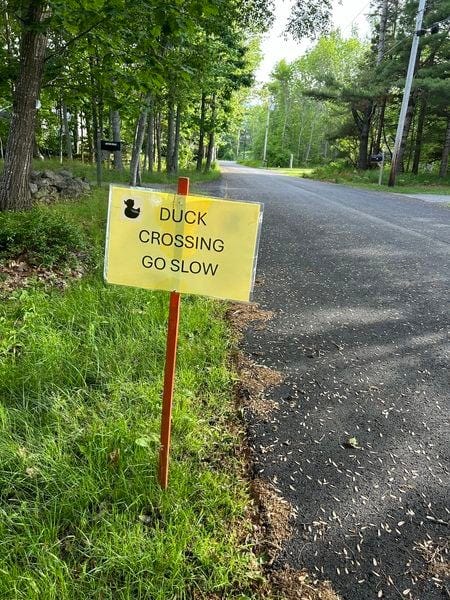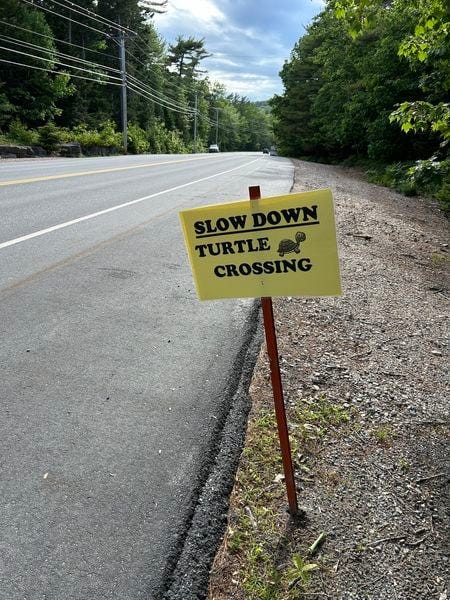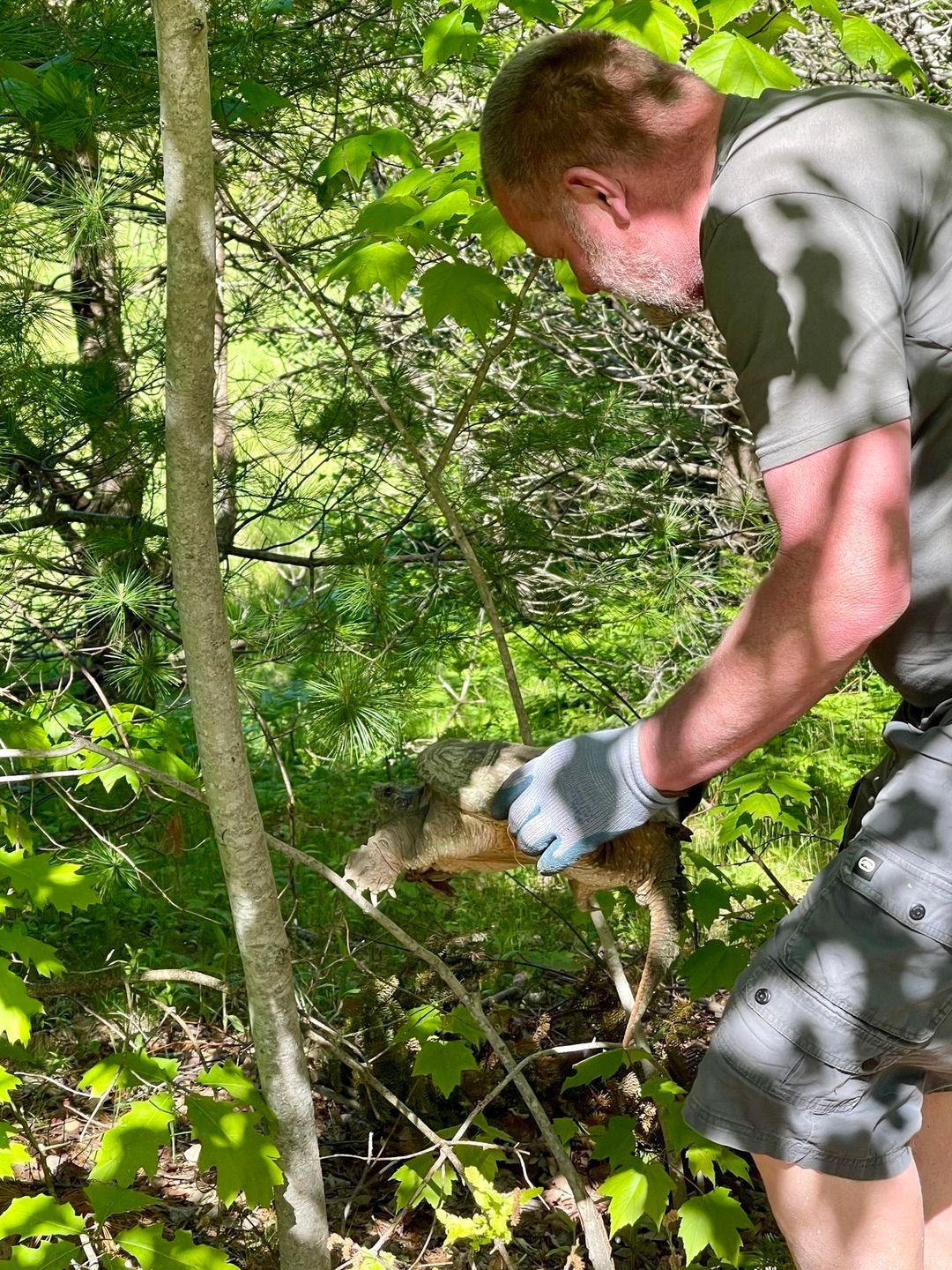MOUNT DESERT ISLAND—Summer is almost here, which means that Mount Desert Island roadways can expect two things: more vehicles and more turtles.
Sadly, the two don’t often mix well, and the winner is almost always the vehicle.
However, the people of Mount Desert Island have a tendency to try to keep the turtles a bit safer and to warn motorists that there might be turtles in the way.
It’s the same thing many have done for ducklings by Devon Road and for salamanders.


Jennifer DuBois Cough at First Express on Cottage Street in Bar Harbor has made signs that locals have been putting up to warn motorists of areas with high turtle activity.
“I made them after I made ducks signs for the kids in the Devon Road area,” DuBois Cough said.
She stopped traffic on the Crooked Road to save a turtle herself.
“Then, as usual, people who are awesome hopped on board and here we are…. I have some more going out today!” she said.
DuBois Cough gives much of the signs’ credit to Diana de los Santos, Meredith Gabbard, and Rick Melasecca.
Former Bar Harbor and Mount Desert Animal Control Officer Diana de los Santos, who’d been hired by former Police Chief Nathan Young had created animal crossing signs and initiatives to help alert motorists. When she moved in 2021, she pulled up the signs and gave them to Mount Desert and Bar Harbor Police Lt. Kevin Edgewood.
Gabbard and Melasecca worried about those ducks, then extended their efforts to turtles, she said.
There have been turtles spotted on Route 3, Eagle Lake Road, by the Tarn, Beech Hill Cross Road, Denning Brook, and the Crooked Road.
Turtles are not usually fast-moving creatures. They look for mates in May. They lay their eggs then and in June. During this time of year, they hunt for sandy places to lay their eggs. Roadside embankments, the area just beyond the breakdown lanes attract them and they will often make their nests there.
In 2023, Acadia Wildlife Center took care of a nesting painted turtle that had been hit crossing the road.
“She had shell damage both top and bottom from a car hit but fortunately her spine and legs are intact,” they said. “The breaks will take awhile to heal, both are serious. Remember if you help an uninjured turtle, to move it to the side of the road where it was headed. They know what they are doing and where they want to go to lay their eggs. If their shell is damaged please call the nearest wildlife rehabilitator for medical help.”

According to the Maine Department of Inland Fisheries, “Turtles are known for being slow, but it's not their speed on land or water that concerns biologists. It's their slow reproductive speed that puts them at a disadvantage and a fast-changing world.”
Wood turtles are ten before they start to breed. Blanding’s turtles take 14 years.
“Once turtles finally breed, both their eggs and hatchlings are vulnerable to predation by a slew of other wildlife. With no parental care, tiny hatchlings have a dangerously independent start to life. An adult female turtle may reproduce for her entire long life yet only have a single hatchling survive to reproductive age and help sustain the population,” the department writes. “When you add the pressure of habitat loss and fragmentation, road mortality, and overcollection for the pet trade to their slow reproduction, you can see how an entire population of turtles may be permanently altered by the removal of even one adult.”
There are multiple types of turtle that are more likely to be injured by cars. Those are painted turtles, common snapping turtles, spotted turtles, wood turtles, musk turtles, and Blanding’s turtles.
According to the agency, “The more we know about turtle distribution, abundance, habitat use, and movements, the better equipped we are to protect them. You can help by reporting all turtle sightings to the Maine Amphibian and Reptile Atlas Project at mefishwildlife.com/atlas.”
The Maine Department of Inland Fisheries and Wildlife suggests:
“How to help a turtle cross the road:
If you come across a turtle crossing the road and there is no oncoming traffic, allow the turtle to continue crossing without help. Observe from a distance to ensure it safely reaches the other side. If traffic is coming, don’t put yourself or others in danger, wait until traffic has slowed or stopped before assisting.
If you pick a turtle up to assist, handle it carefully. Gently grasp the shell edge near the mid-point of the body with two hands and bring the turtle in the direction it is heading.
Try to place the turtle at least 30 feet away from the roadside. Do not attempt to move the turtle to a different area, as the turtle will attempt to return to its original spot.
Never grab a turtle by its tail. It could cause dislocation of its spine!
If the turtle is large and heavy, such as a snapping turtle, you can use a car mat to slide the turtle with.”
LINKS TO LEARN MORE
Acadia Wildlife According to the center, “If you have found what you believe is an animal in need, please call us (207) 288-4960 before doing anything, so we can discuss circumstances; safe capture and transport; and if the animal actually needs our help. If you get an answering machine, leave us a message and listen to the instructions carefully. Please be patient, we will call you back as soon as we can.”
First Express in Bar Harbor is at 61 Cottage St, (207) 288-5885, 61cottage@gmail.com
Maine Department of Inland Fisheries or contact the agency by calling 207-287-8000. The Maine Audubon can be contacted at 207-781-2330.
If you’d like to donate to help support us, you can, but no pressure! Just click here.








